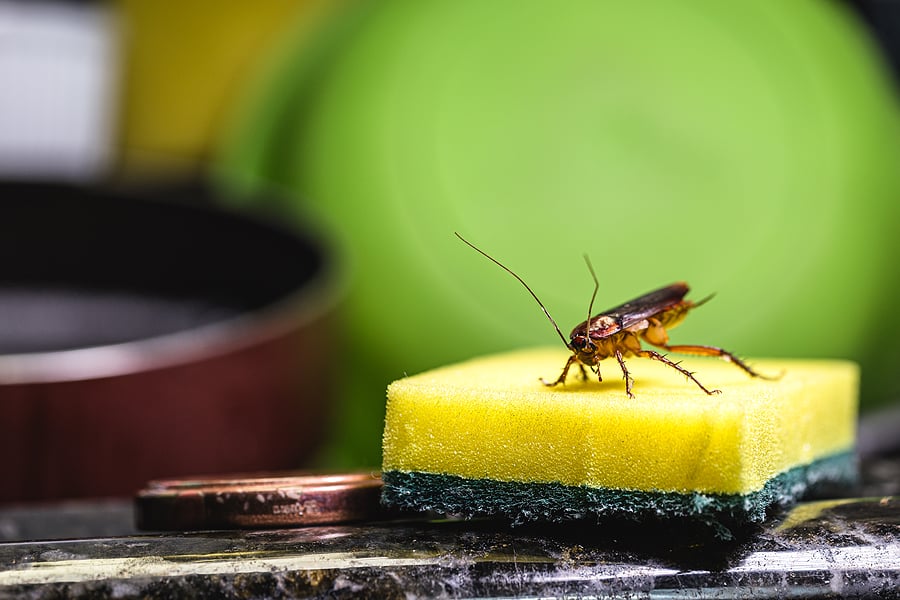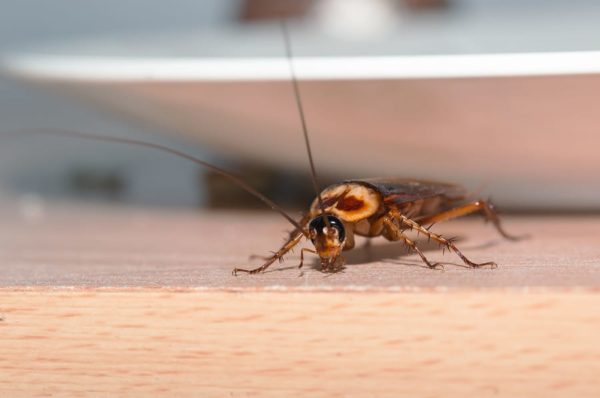READY TO GET STARTED?
REQUEST A FREE ESTIMATE
Fill out the form below or call (888) 466-7849 for a free, no-obligation estimate.

Cockroaches are household pests known for spreading bacteria and triggering allergies and asthma. These nocturnal pests come out at night to feed and hide in cracks and crevices during the day. Roaches are attracted to moisture and are most commonly found in bathrooms, kitchens, laundry rooms, basements, and drains. Because they are nocturnal, you may not notice you have a roach problem until a full blown cockroach infestation has set in. Spotting the signs of cockroaches can help you head off an infestation before it gets out of hand. Here are 7 signs you may have cockroaches.
If your neighbors mention having a roach problem, especially if you live in an apartment, condo, or townhouse, the odds are likely that they will make their way over to your home, as well. One way to help prevent this is by getting rid of what attracts roaches in your home. Don’t put open food containers in the trash; don’t leave crumbs on the floor; clean up messes as they happen; keep garbage cans sealed; and try not to store outdoor trash cans near your home.
Roaches are attracted to moisture so they are often found in areas of high moisture in your home. In these areas, they will often produce dark, irregularly-shaped smear marks as they rest or crawl along walls. These smears are often seen on horizontal surfaces and where the wall and floor meet.
Roaches leave droppings behind wherever they are. The size and shape of droppings vary between species. Some species leave behind a small brown stain. German cockroaches leave behind pepper-like specks that can also resemble coffee grounds. The larger American cockroach species leaves behind droppings closer to a grain of rice. The most common places to check for droppings are floor corners, cabinets, under the fridge, and under the stove. It is important to clean any droppings up when you find them as they are known to spread bacteria.
Egg casings are long, hollow, light brown tubes that hold cockroach eggs, anywhere from 20 to 50 at a time. Although most species leave egg casings behind once the eggs are laid, some species actually carry them with them until their offspring hatch. Egg casings are usually found at the base of the refrigerator, in cabinets that store food, and near leaky pipes. If you find a casing that still has eggs in it, dispose of it by flushing it down the toilet.
Roaches and their feces give off a musky, unpleasant odor. While one roach usually doesn’t emit a strong enough odor to be detected by humans, when larger numbers of roaches get together the smell gets stronger and more easily detected. While the smell is usually associated with live roaches, dead cockroaches can also emit the odor as part of the decomposition process.
The feces and exoskeleton of cockroaches contain proteins that can trigger allergies and asthma. If you don’t usually have allergies and have symptoms appear without a known trigger; or your current allergy and asthma symptoms seem to get worse without a known trigger this may indicate the presence of cockroaches in your home. Symptoms include stuffy nose, wheezing, red itching eyes, shortness of breath, chest tightness, and the increased use of your inhaler.
If you see one roach, the odds are likely that there are many others present. Roaches are nocturnal and usually spotted at night. If you are seeing roaches during the day, overcrowding from an infestation may be forcing them out in the open.
The best way to avoid a roach infestation is to prevent them in the first place. Prevent cockroaches by:
If you have a problem with roaches or any other pest, contact your local pest control company for a free analysis and comprehensive treatment plan.
Bed Bugs: Where Do They Come From?
How to Prevent Little Black Ants

Cockroaches have been around for over 300 million years – even longer than the dinosaurs! These pests are resilient and adaptive with odd behaviors and survival tactics which have helped them survive for so long. While most homeowners are aware of the health risks associated with roaches, including allergies, asthma, and the spread of germs and bacteria, there are lots of interesting facts about cockroaches you might not realize. Here are 7 things you might not know about cockroaches.
Cockroaches are one of the most highly adaptable pests on earth which makes them extremely difficult to control or eliminate. To prevent cockroaches keep food sealed and stored properly; clean your kitchen daily; don’t leave food or pet food out overnight; dispose of garbage regularly and use cans with sealing and locking lids; identify any small cracks or holes around your home and seal them; and make sure basements and crawlspaces are kept dry and well ventilated. If you suspect you have a cockroach infestation, contact a professional pest control company who can provide you with a thorough evaluation and appropriate treatment and prevention plan.
How Much Does A Mosquito Treatment Cost?